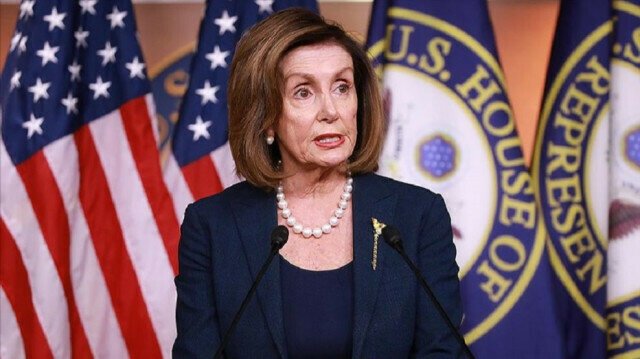US House of Representatives Speaker Nancy Pelosi warned the UK on Friday that a possible US-UK trade deal will be jeopardized if disagreements with the EU, which threatens peace in Northern Ireland, are not eliminated.
Pelosi’s remarks came during her visit to London, where she met with Prime Minister Boris Johnson.
Following the meeting, Pelosi said: “Respectful of the will of the British people and Brexit, I reiterated the strong bipartisan support that the Good Friday Accords continue to enjoy in the United States Congress and our hope that the ongoing negotiations will yield a positive outcome that recognizes this landmark agreement.”
Previously, US President Joe Biden has repeatedly warned that the peace in Northern Ireland should be kept and the Good Friday Agreement must be preserved.
Pelosi also spoke at an event hosted by the think-tank Chatham House in London.
She said a transatlantic trade deal was “very unlikely” if the 1998 Belfast (Good Friday) Agreement was destroyed.
“This is not a threat, it’s a prediction,” she said.
“I’m so glad that more time has been given for the negotiations and the discussion, because they have to reach an agreement,” she added.
Johnson “outlined the U.K.’s concerns with the way the (Northern Ireland) Protocol is being implemented and the impact it is having on the people of Northern Ireland,” according to a statement by the prime minister’s office.
Dozens of police officers were injured, public buses and cars were damaged during riots by the loyalist groups in Northern Ireland earlier this year.
The loyalists argue that the Northern Ireland Protocol, which aligns the region with the EU in a bid to avoid a hard border in the island, created a de facto border between Northern Ireland and the rest of the UK, imposing a border check on goods between Great Britain and the region.
In a recent address, Democratic Unionist Party leader Jeffrey Donaldson outlined his willingness to bring down the Stormont (Northern Ireland Assembly) if the protocol is not changed substantially.
Northern Ireland voted to remain in the EU in a 2016 referendum, but it is feared the Brexit process could trigger enmity in the region.
The Troubles – an era of conflict between the British government and pro-British paramilitaries on one side and Irish Republicans and nationalists on the other – ended in 1998 when the Belfast Agreement put an end to decades of armed struggle in the divided UK region of Northern Ireland.
The UK and the Republic of Ireland signed the deal, brokered by the US and eight political parties in Northern Ireland, on April 10, 1998.
The deal, dubbed the Good Friday Agreement, largely saw the end of the Troubles-era violence, in which 3,500 people lost their lives.










Discussion about this post